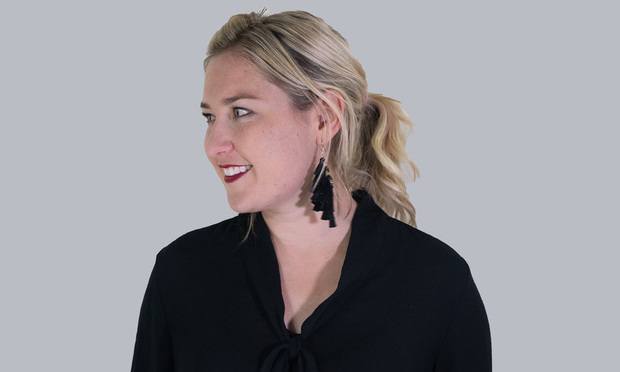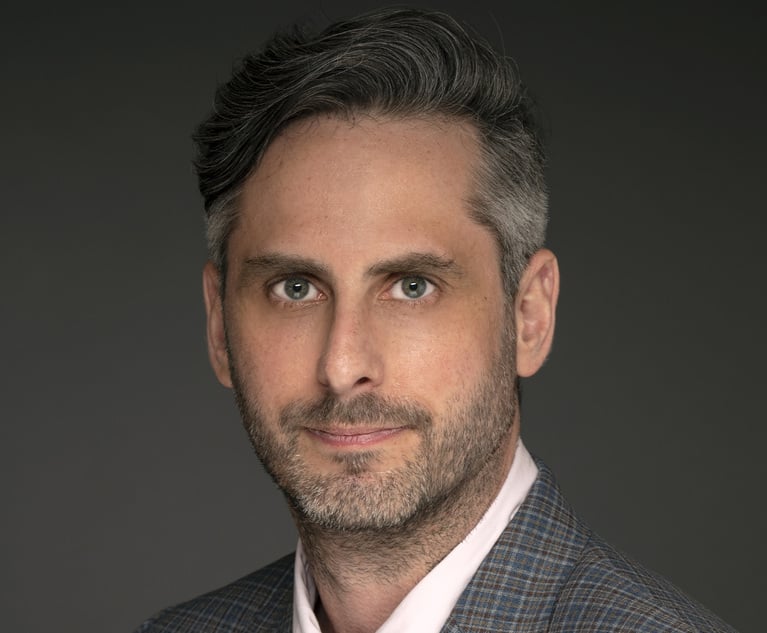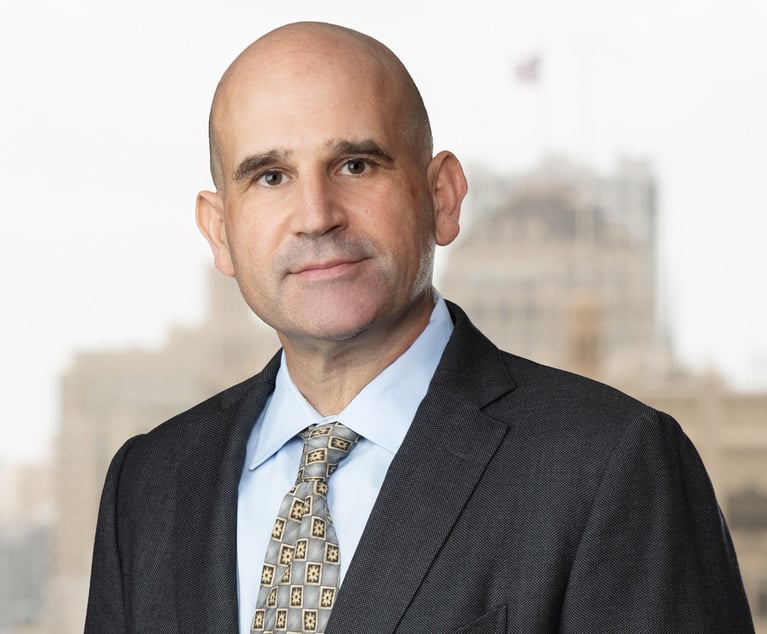Cannabis In-House Attorney: 'Now Is the Time' for Lawyers to Enter the Industry
Elyse Kaplan's advice to attorneys considering an entrance into the weed business: "If you're thinking about it, I would say now is the time. Try to get in however you can."
October 04, 2018 at 04:57 PM
7 minute read
The original version of this story was published on Corporate Counsel
 Elyse Kaplan, corporate counsel at Vertical, a California-based cannabis company. Courtesy photo
Elyse Kaplan, corporate counsel at Vertical, a California-based cannabis company. Courtesy photo
The transition from a firm to in-house role can be a challenging one, but that's not all attorney Elyse Kaplan was facing six months ago when she started at her first-ever legal department job.
When Kaplan joined cannabis company Vertical as corporate counsel, she was also entering an industry she'd never worked in before, a space with ever-evolving regulations. Kaplan came to the California-based cannabis industry company from immigration law firm Hadley Bajramovic.
So far, she's spent her days at Vertical getting caught up on cannabis law and working with regulatory agencies. The Recorder affiliate Corporate Counsel spoke recently with Kaplan about her move in-house, collaborating with regulators, and why “now is the time” for lawyers to break into cannabis. This conversation has been edited for clarity and length.
Corporate Counsel: Why did you move from immigration to the cannabis industry?
Elyse Kaplan: Immigration is just so … it's a mess right now. … It's so backed up and everything is a gridlock, so nothing is happening there and it's really depressing. I just saw this really exciting new opportunity. I'm a relatively young, female lawyer and I thought what a cool opportunity to take this job and make a big impact in a new industry.
What are some of the impacts you're hoping to have?
What's really exciting is that everything is so new right now. As they start legalizing cannabis in California, all these new agencies are being created in the government and all these regulations are being put into place and nobody really knows what is happening yet. So there is a lot of opportunity, I think, to define what those regulations mean or what they're going to look like and how things are going to play out.
Right now I'm working mostly on regulatory compliance and licensing. A lot of these agencies are just being created, so they're learning just as much as we're learning. It's kind of a cool collaborative process.
As you mentioned, many in the cannabis industry are newcomers. Does that affect compliance efforts and regulations?
The good thing is that everybody is excited to learn. Even the government agencies are willing to have a conversation with you and to educate you on their perspective and to ask for your feedback. It's not as negative as you might think.
But it is definitely interesting. I had a meeting with the California Department of Fish and Wildlife at one of our properties last week, and one of the agency representatives said his first day was Monday, and I think the meeting was Tuesday. So many people are new.
How can newcomers get up to speed and learn what they need to know to be successful in the cannabis industry?
That's the real hard part. Because right now we have the emergency regulations from every agency, which is what is controlling right now. But then we have the proposed regulation, that is going through the process of possibly becoming law, but we don't know how that's going to change or look.
How did you prepare for this role?
Reading the regulations. It's a very friendly industry, people are always willing to talk to you and help out. In some sense, there aren't a lot of ways to prepare except jumping in. A lot of times it feels like I'm trying to build the plane while flying it.
What does your in-house role at Vertical look like aside from watching cannabis regulations?
I am mostly working on regulatory and compliance, but because we are working on so many different counties and we are trying to do so many different things—we're cultivating, we're manufacturing, we're doing distribution—it's actually a really, really big job to be compliant in all those areas.
We have another lawyer who helps with all the contracts. We have outside counsel who help with all our employment issues and anything else that comes up, we usually try to find someone to help us and bring them in.
Is this your first in-house role? If so, what's it like starting at a cannabis company?
It is my first in-house role. I really like it, because it gives me one thing to focus on. I always know who my client is, I know what my goals are, which makes it really simple. I get to deep dive into this one area of law, but at the same time I have an opportunity to oversee contracts, oversee employment and arbitration stuff, so it doesn't get boring at all.
A lot of things in immigration are already set. I know there are a lot of changes and it changes based on who is in charge politically, but a lot of the law is set in stone. In the cannabis industry, there's more wiggle room, there's ways to interpret things. You get to think things through more and I really like that aspect of it.
What are in-house lawyers in the cannabis space watching now?
What haven't we been watching? There's so much happening. We're watching for what's happening at the federal level, because cannabis is, of course, still not legal on the federal level. We're always watching that.
Here in California, all the different groups, the California Department of Food and Agriculture, the Department of Health Care Services and the Bureau of Cannabis Control, they are all working on putting out their proposed regulation, instead of the emergency ones. We're watching to see what changes are being made there.
A lot is happening on this delivery issue, meaning how cannabis is delivered to private property. Labeling—there are a lot of changes in how cannabis must be labeled or put out for marketing purposes.
What advice do you have for lawyers who want to move to an in-house role at a cannabis company?
If you're thinking about it, I would say now is the time. Try to get in however you can. I think there's such a cultural attitude shift on cannabis right now, and it's becoming increasingly apparent how lucrative this industry is going to be. You're seeing this huge migration of people in more traditional roles coming to cannabis. It's only going to get bigger and bigger from here.
Anything else you wanted to discuss today?
Specifically, it's a really exciting time for women in the cannabis industry. I think in 2015 women held 36 percent of all leadership roles in the cannabis industry, and three years later in 2018 that number is already down to 27 percent. So I'm someone who is advocating for more women to come into the space.
Why do you think the number of women in leadership roles may have decreased?
I think it's because, like I said, you have this huge cultural shift. So you're seeing more of the traditional, senior-level male executives coming in, and as they do, women start to maybe get pushed out a little more. I think it's really important that we advocate for women to keep staying in the space and making their voices heard here.
Read more:
Lawyers Advising on State Cannabis Won't Break Bar Rule
Ninth Circuit Cannabis Ruling Gives Biz Owner New Chance to Fight Charges
This content has been archived. It is available through our partners, LexisNexis® and Bloomberg Law.
To view this content, please continue to their sites.
Not a Lexis Subscriber?
Subscribe Now
Not a Bloomberg Law Subscriber?
Subscribe Now
NOT FOR REPRINT
© 2025 ALM Global, LLC, All Rights Reserved. Request academic re-use from www.copyright.com. All other uses, submit a request to [email protected]. For more information visit Asset & Logo Licensing.
You Might Like
View All
US Patent Innovators Can Look to International Trade Commission Enforcement for Protection, IP Lawyers Say

How the Deal Got Done: Sidley Austin and NWSL Angel City Football Club/Iger

How Uncertainty in College Athletics Compensation Could Drive Lawsuits in 2025

How I Made Practice Group Chair: 'Think About Why You Want the Role, Because It Is Not an Easy Job,' Says Aaron Rubin of Morrison Foerster
Trending Stories
- 1'If the Job Is Better, You Get Better': Chief District Judge Discusses Overcoming Negative Perceptions During Q&A
- 2Nondisparagement Clauses in Divorce: Balancing Family Harmony and Free Speech
- 3Survey Finds Majority of Legal Professionals Still Intimidated by AI Despite Need to Streamline Mounting Caseloads
- 4Lessons From Five Popular Change Management Concepts: A Guide for Law Firm Leaders in 2025
- 5People in the News—Jan. 15, 2025—Ballard Spahr, Brahin Law
Who Got The Work
J. Brugh Lower of Gibbons has entered an appearance for industrial equipment supplier Devco Corporation in a pending trademark infringement lawsuit. The suit, accusing the defendant of selling knock-off Graco products, was filed Dec. 18 in New Jersey District Court by Rivkin Radler on behalf of Graco Inc. and Graco Minnesota. The case, assigned to U.S. District Judge Zahid N. Quraishi, is 3:24-cv-11294, Graco Inc. et al v. Devco Corporation.
Who Got The Work
Rebecca Maller-Stein and Kent A. Yalowitz of Arnold & Porter Kaye Scholer have entered their appearances for Hanaco Venture Capital and its executives, Lior Prosor and David Frankel, in a pending securities lawsuit. The action, filed on Dec. 24 in New York Southern District Court by Zell, Aron & Co. on behalf of Goldeneye Advisors, accuses the defendants of negligently and fraudulently managing the plaintiff's $1 million investment. The case, assigned to U.S. District Judge Vernon S. Broderick, is 1:24-cv-09918, Goldeneye Advisors, LLC v. Hanaco Venture Capital, Ltd. et al.
Who Got The Work
Attorneys from A&O Shearman has stepped in as defense counsel for Toronto-Dominion Bank and other defendants in a pending securities class action. The suit, filed Dec. 11 in New York Southern District Court by Bleichmar Fonti & Auld, accuses the defendants of concealing the bank's 'pervasive' deficiencies in regards to its compliance with the Bank Secrecy Act and the quality of its anti-money laundering controls. The case, assigned to U.S. District Judge Arun Subramanian, is 1:24-cv-09445, Gonzalez v. The Toronto-Dominion Bank et al.
Who Got The Work
Crown Castle International, a Pennsylvania company providing shared communications infrastructure, has turned to Luke D. Wolf of Gordon Rees Scully Mansukhani to fend off a pending breach-of-contract lawsuit. The court action, filed Nov. 25 in Michigan Eastern District Court by Hooper Hathaway PC on behalf of The Town Residences LLC, accuses Crown Castle of failing to transfer approximately $30,000 in utility payments from T-Mobile in breach of a roof-top lease and assignment agreement. The case, assigned to U.S. District Judge Susan K. Declercq, is 2:24-cv-13131, The Town Residences LLC v. T-Mobile US, Inc. et al.
Who Got The Work
Wilfred P. Coronato and Daniel M. Schwartz of McCarter & English have stepped in as defense counsel to Electrolux Home Products Inc. in a pending product liability lawsuit. The court action, filed Nov. 26 in New York Eastern District Court by Poulos Lopiccolo PC and Nagel Rice LLP on behalf of David Stern, alleges that the defendant's refrigerators’ drawers and shelving repeatedly break and fall apart within months after purchase. The case, assigned to U.S. District Judge Joan M. Azrack, is 2:24-cv-08204, Stern v. Electrolux Home Products, Inc.
Featured Firms
Law Offices of Gary Martin Hays & Associates, P.C.
(470) 294-1674
Law Offices of Mark E. Salomone
(857) 444-6468
Smith & Hassler
(713) 739-1250






